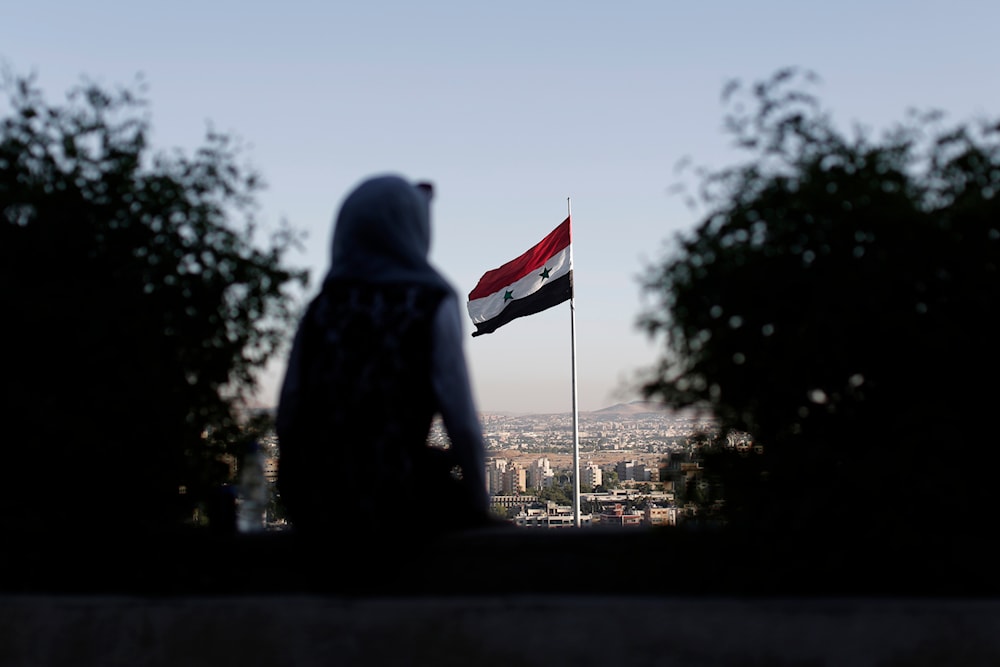Syria raises salaries for public sector workers by 50%
Syria increases the salaries of its public sector employees by 50% amid an inflation crisis brought upon the country by Western sanctions and years of war.
-

A young woman sits in a public garden overlooking the Syrian capital Damascus, Syria, July 24, 2019 (AP)
In a bid to tackle the unprecedented economic challenges exacerbated by years of war being waged on Syria, not to mention the crippling Western sanctions, Syrian President Bashar al-Assad has taken decisive steps aimed at alleviating the economic crisis.
The government's recent decision to implement a 50% pay raise for civil servants, military personnel, and public sector pensioners demonstrates its commitment to mitigating the devastating effects of inflation and soaring living costs.
President Assad had previously announced a doubling of salaries and pension payments last year, coupled with the removal of fuel subsidies.
These measures are crucial as the Syrian economy has been grappling with the consequences of a protracted conflict that has claimed the lives of over 500,000 people and displaced millions since its onset in 2011.
The Western sanctions, primarily imposed by the United States and other Western governments, have intensified the economic challenges faced by Syria.
The sanctions, criticized by many as contributing to the severe economic crisis, have resulted in more than 90% of Syrians living in poverty, according to UN figures. The value of the Syrian pound has plummeted, experiencing a loss of over 99% of its value since the conflict began, leading to a surge in prices and inflation.
The recent pay raise saw civil servants grappling with monthly salaries ranging from $20 to $40, depending on the fluctuating value of the Syrian pound.
A presidential decree issued on Monday set the minimum monthly wage in the private sector at 278,190 Syrian pounds.
These measures aim to address the economic imbalances and provide a much-needed boost to the nation's workforce.
The Syrian pound, currently trading at around 14,500 to the US dollar on unofficial monitoring websites, reflects the adverse impact of the economic crisis brought upon by devastating sanctions coupled with over a decade of war. The currency's official rate stands at 12,500.
Western sanctions not budging
As the United Nations reports an increasing need for humanitarian aid, with 16.7 million Syrians requiring assistance in 2024, the West, namely the United States is not letting off when it comes to the stifling sanctions it has posed on Syria.
In fact, the Western governments, at the helm of which is the US, refused to alleviate sanctions on Syria even at the most trying times; during 2023's devastating earthquake that killed thousands of people.
As thousands, including children, were calling for help from under the rubble in Syria, the rolling crises through which most Syrians are living didn't gain international support mainly due to the US draconian sanctions.
Officials say it will be years before the streetscapes of the stricken areas bear any resemblance to their old selves. Some buildings may look okay from the outside. However, certain structural components might have been damaged to the extent that some of these buildings will have to be torn down; a process that alone could take years.
In 2020, then-US President Donald Trump signed into law the so-called Caesar Act, under which Congress authorized severe economic sanctions against Syria. In accordance with the sanctions, anyone doing business with the Syrian authorities is potentially exposed to travel restrictions and financial sanctions.
The US claims that "the Caesar Act and other USW Syria sanctions do not target humanitarian assistance for the Syrian people" and that Washington will continue sending its alleged humanitarian assistance to Syrians. However, this was not the case following the devastating earthquake that struck Syria and was not mentioned anywhere in Biden's remarks.

 4 Min Read
4 Min Read








